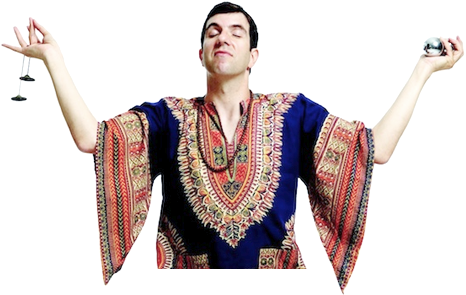Q&A
INTERVIEW
Q: Why in the name of God did you do this?
A: There were two reasons. First, my IQ had done a slow but steady swan dive since I graduated college. If things continued, I’d be spending my days watching Wheel of Fortune and drooling into a bucket. I thought something drastic needed to be done. Second, I was inspired by my father. When I was a kid, my dad began to read the encyclopedia but made it only up to the letter B, around Borneo. I wanted to finish what he started and remove that black mark from our family name.
Q: What was your favorite letter?
A: I have to go with Q, because it was so short, a mere couple hundred pages. And I learned a great two-letter word: qa, a Babylonian liquid measurement. So use that next time you’re playing Scrabble-or measuring Babylonian liquids.
Q: How much do you remember?
A: Well, I’m hazy on a couple of rivers in Bolivia. And a few thousand other things. But I do remember more than I thought I would. I know this because the facts are always popping up in my brain. I can’t help it. It’s like a sickness. If I see a cat, I’ll think of how the Egyptians made mummies of their cats, but also mummies of their mice so the cats would have something to eat in the afterlife (very considerate of them).
Q: What was the most surprising fact?
A: That lightning goes up. Granted, first it goes down from the cloud to the ground. But the part that you see-the part that flashes-is the return bolt that travels from the ground to the cloud. Profoundly counterintuitive.
Q: What was the saddest part?
A: Hard to say. Reading through all of history, you are reminded just how amazing human beings can be but also how utterly horrible and violent. I was particularly struck by the Taiping Rebellion in China. The Taiping Rebellion occurred about the same time as our Civil War. In our Civil War, six hundred thousand people died. In the Taiping Rebellion, twenty million died. Twenty million. A staggering number. The rebellion was basically a cult gone horribly awry. It was begun by a man named Hung Hsiu Chuan, who believed he was the second coming of Christ. He recruited millions of followers, started a large harem for himself (though sex among his followers was forbidden), and waged war on the empire. Eventually, the rebellion was put down by, in part, a man named General Tso, whom we all know from the chicken entrée.
Q: What bigger lessons did you learn?
A: There was plenty of wisdom in the Britannica, which I delve into in my book. But I’ll mention one thing that struck me: There is nothing new under the sun. Everything has a precedent. Everything has a history. This was brought home when I read about the history of things like canned laughter, which began long, long before Lucy stuffed chocolates in her face or Ralph Kramden threatened his wife with physical violence. The Greek playwrights hired people to laugh at their comedies. But the true pinnacle of canned laughter came in nineteenth-century France. Almost every theater in France was forced to hire a band called a claque-from claquer, “to clap.” The influential claque leaders, called the chefs de claque, got a monthly payment from the actors. And the brilliant innovation they came up with was specialization; each claque member had his or her own important job to perform. There were the rieurs, who laughed loudly during comedies. There were the bisseurs, who shouted for encores. There were the commissaires, who would elbow their neighbors and say, “This is the good part.” And my favorite of all, the pluereuses, women who were paid good francs to weep at the sad parts of tragedies. An excellent idea. I don’t see why the networks don’t add a weep track to The West Wing.
Q: What was your favorite word?
A: I learned a lot of strange words, including the vowel-starved crwth, a Welsh musical instrument. But I think I have newfound appreciation for the word berserk, which comes from “berserkers,” notorious Scandinavian soldiers who apparently fought naked.
Q: Who was your favorite historical character?
A: It’s hard to choose, but I’ll go with someone from the W’s: Victoria Woodhull, the great nineteenth-century reformer and advocate of free love. She was the first woman to run for president and the first female stockbroker. She was also a renowned psychic. Which I always thought made a great combination: a psychic stockbroker. Who wouldn’t want that?
Q: What was the weirdest experience you had during your project
A: The book follows not just my reading but my out-of-the-house adventures to test the limits of knowledge and intelligence. I went on Who Wants to Be a Millionaire, attended a crossword-puzzle tournament, and played chess with masters. But the strangest, I think, was my trip to the Mensa convention. Mensans are people-God love them-who go out of their way to reinforce every stereotype you might have about Mensans. Just one example: They all have name tags with color-coded stickers on them. A green sticker means Yes, I want a hug. A yellow sticker means Ask before hugging. Red-no hugs at all. One guy had three green stickers, which I guess meant he really, really wanted a hug.
Q: What was the most profound passage?
A: This, from the philosophy section. It was written by an anthropologist and philosopher named Robert Ardrey, and I find it to be a wonderful expression of optimism: Humans were born of risen apes, not fallen angels, and the apes were armed killers besides. And so what shall we wonder at? Our murders and massacres and missiles? Or our treaties whatever they may be worth; our symphonies however seldom they may be played; our peaceful acres however frequently they may be turned into battlefields. The miracle of man is not how far he has sunk, but how magnificently he has risen. We are known among the stars by our poems, not our corpses.



